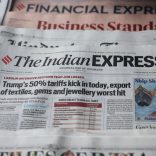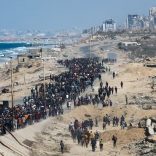Trump's 50% tariff on India kicks in as Modi urges self-reliance
Sanctions on Russia should not penalize African countries – Costa
(FILE PHOTO: for illustration purposes only)
Prime Minister of Portugal, António Costa, argued in Brussels this Thursday that it was essential to maintain sanctions against Russia and Belarus, but warned that it is also necessary to ensure that African and Latin American countries do not suffer ‘unwanted collateral consequences’.
António Costa’s reaction comes 13 months after the start of the war in Ukraine (the West calls it ‘invasion of Ukraine by Russia’, the Russians, a ‘special operation’), and sanctions against Russia, already in their tenth iteration, are having serious consequences for African countries, including Mozambique.
‘We can never ignore that, in these sanctions against Russia and Belarus, we have to preserve the conditions so that all other third countries, namely African countries and Latin American countries, do not suffer unwanted collateral consequences,” Costa said shortly before the start of the European Council meeting in Brussels, Belgium.
The Portuguese prime minister added that the EU had to consider the possibility of blocking agricultural production ‘via these sanctions’, which the EU wants to extend to more states, but that this had an influence on countries who are pressuring Russia to end the conflict in Ukraine.
United Nations Secretary General António Guterres is attending this Thursday’s meeting of the European Council, and said when he arrived that he would ‘share views’ with EU member states on sanctions.
António Costa considered that it is important that “the European Union knows how to listen to the wise and common-sense voice of the UN secretary general so that the sanctions achieve the intended objectives”, but “without this affecting other countries, other peoples, and, much less jeopardizing global food security”.
The leader of the Portuguese executive recalled that since the beginning of the conflict in February last year, “Russia has lost all important votes” in the UN General Assembly.
However, in order to continue to exert pressure on Moscow, “it is fundamental that it is not just European countries” getting involved. António Costa praised António Guterres’ role in building the ‘Black Sea Grain Initiative’, which allowed the export of more than 23 million tons of Ukrainian cereals, helping to contain the rise in food prices.
The export of these cereals from Ukraine, one of the world’s largest cereal exporters, is particularly relevant to African countries, where there are shortages. “War in Ukraine means famine in Africa,” said Director General of the International Monetary Fund ( IMF), Kristalina Georgieva.
Despite the EU’s commitment to Ukraine, António Costa recalled that this is just “one dimension of international relations” and “one should not minimize the commitments that the European Union gave the African Union, for example, at its summit a year ago”.
The prime minister also warned of the growing tension between Washington and Beijing.
“We do not want to live in a world where, after decades of polarization between the former Soviet Union and the United States of America, we have a new world fragmented between China and the United States. There is a role that Europe, Africa and Latin America can and must play, along with other Asian partners, in order to have a fairer, more balanced world where peace is consolidated,” he said.
António Costa met António Guterres this Thursday before the European Council meeting in Brussels. Sanctions against Russia are the theme of the summit, which will last for two days, but the European leaders will also talk about the economy and the energy market.
In this specific case, the prime minister acknowledged that he expected more from the European Commission.
Costa said that the European Council is debating “the global challenges facing all companies”, in addition to strengthening competitiveness for “better economic governance in Europe”.
The prime minister stresses that “there are positive proposals [coming] from the European Commission”, but there is, however, a “big gap”, in that there is no “permanent mechanism for stabilizing crises” such as the recent Covid-19 pandemic.
On the table will also be proposals for the creation of “a more efficient energy market”, despite the head of government confessing that he is “a little disappointed with the Commission’s proposal”, specifically “dubious logic of indexing the price of electricity to the highest price of the source of electricity production”.
Regarding the banking union, “which has unfortunately gained new notoriety”, the prime minister recalled that “there continues to be a fundamental element that remains to be implemented, namely the guarantee of deposits”.
For António Costa, Guterres’ participation in the meeting “is very important”.
“It is critical that sanctions against Russia and Belarus be maintained in support of peace in Ukraine and Kiev’s ability to maintain its defence,” he underlined.












Leave a Reply
Be the First to Comment!
You must be logged in to post a comment.
You must be logged in to post a comment.